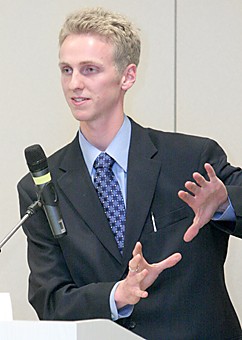Candidates for student government administrative and executive vice president stressed the need for increased marketing of student programs and services as well as more club funding, but disagreed on courses of action at last night’s debate.
Administrative vice presidential candidate Sen. Jami Reinsch, a journalism and media arts junior, began the debate with opponent Sen. Ty Reece, a dietetics sophomore, in the Student Union Memorial Center’s Kiva Room.
Reece said if elected, he would expand the efficiency of student programs and services by heavily marketing them at a “”revamped”” fall fair.
“”If a program exists that students don’t know about, then it might as well not even exist,”” said Reece, an Associated Students of the University of Arizona club advocate confirmed as the 10th senator last week.
In order to increase efficiency, Reece said he wanted to combine or even dismantle less-successful programs in order to cut back on costs, a platform point his opponent, Reinsch, disagreed with.
Reinsch said combining them would disrupt the way certain programs are run, and all the programs are in place because they are needed.
“”Each program has a purpose and was created for a purpose,”” Reinsch said. “”They all have their own mission statements.””
Reece said both he and Reinsch had done their research and were aware of the need for better marketing within student government.
“”For all students know, ASUA is just a bunch of Canadians sitting around, talking about ASU, eh?”” Reece commented, drawing chuckles from the crowd.
By increasing one-on-one interactions on the UA Mall, Reinsch said she could better inform students about what their student government offers them and get them excited about new events.
“”If the same events happen year after year, they got old and you lose attendance,”” Reinsch said.
The debate was moderated by Lisa Lovallo, development director for the dean of students, who said she participated in a similar debate when she ran for administrative vice president, a position that oversees programs and services within ASUA, in 1986.
“”I was impressed. They did a nice job covering the issues and staying student-focused,”” Lovallo said.
Sen. Rhonda Tubbs, a finance senior, opened the executive vice president debate with a statement that just three days ago, she was still fighting to be able to participate.
After receiving a series of campaign violations and being disqualified after the primaries, Tubbs was re-admitted to the elections by the ASUA supreme court Monday.
Both Tubbs and her opponent David Reece, a history sophomore and Ty Reece’s cousin, said that as executive vice president, they would want to see funding for clubs increase.
Tubbs said that this year she brought in $20,000 through outside funding for the Laptop Loaner Program, and she plans to do it again this year through the contacts she’s made with alumni and corporations.
“”I’m going to go back to those people, fill out those grants and make sure we have that money at the beginning of the year,”” Tubbs said.
This year, clubs were allocated $80,000, an amount David Reece said he can increase to $150,000 by adjusting ASUA’s budget before tapping into outside resources.
“”It dropped from $135,000 last year to $80,000 this year,”” David Reece said. “”Clubs probably weren’t prepared for that.””
Tubbs outlined a program she wanted to implement called “”Pages for Wages,”” which would allow students to work at the UofA Bookstores and receive a discount on textbooks.
David Reece said he has gained enough experience this year while serving as the chief of staff for Executive Vice President Erin Hertzog to know how to advocate for clubs – financially and otherwise.
David Reece said he had to take on some of Hertzog’s responsibilities when she became acting ASUA president and adapted to the changes in the ASUA office.
General elections will be held March 7 and 8.









